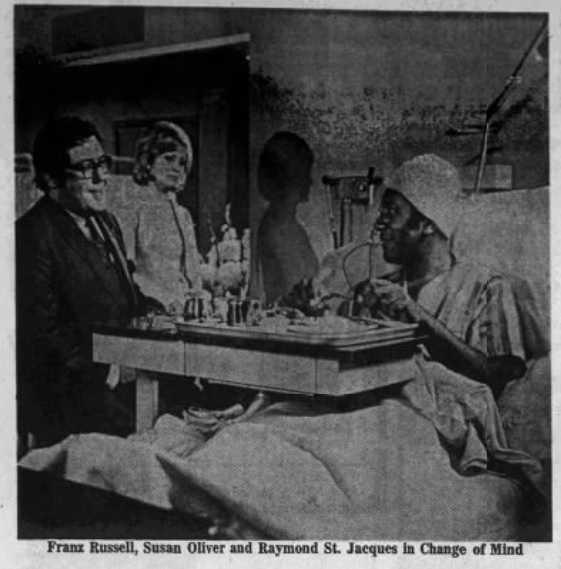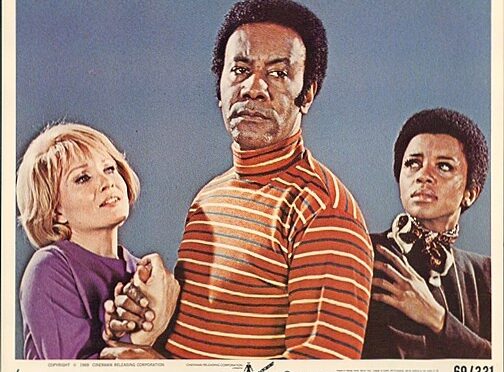Trek Correspondent Joe Reid has jumped from TV to film. We think you'll enjoy his take on a most mind-altering movie!

by Joe Reid

Change of Mind, directed by Robert Stevens, is a film about David Rowe (played by Raymond St. Jacques), a successful white district attorney whose brain is transplanted into the body of a terminally injured Black man, Ralph Dickson. The story operates on many layers: it’s a respectful and intelligent thought experiment on how a newly reborn Black man might engage with and find relevance in a prejudiced society. It’s also a courtroom drama about the murder of a woman and the fight to bring her killer to justice. Primarily, however, this movie explores the complexities of the relationship between David and his wife, Margaret Rowe (played by Susan Oliver of Star Trek fame), who struggles to fully accept her husband after his physical transformation.
The title, Change of Mind, is somewhat misleading, as David Rowe’s mind doesn’t really change throughout the movie. Instead, it’s the minds of those around him that David must work to change.

My overall experience watching Change of Mind was a pleasant one. However, I have three key criticisms of the film. First, the movie starts abruptly with the brain surgery, never allowing the audience to experience the white David Rowe or the original Ralph Dickson. While I understand that this approach was likely more efficient and less complicated (as it avoids the need for two actors to portray the same character), it is a missed opportunity for deeper context. Second, there were a few strange, psychedelic dream sequences—while musically scored by the great Duke Ellington, they felt somewhat out of place within the overall narrative. Lastly, the ending was too abrupt. David, through grit and integrity, overcomes numerous challenges and takes some losses, all in pursuit of the truth. He’s portrayed as a character who does everything right. But at the last minute, he makes a seemingly foolish decision, and the movie ends. The conclusion felt jarring, to say the least.
What I liked most about the movie is that it successfully delivered on its key themes. There are many scenes featuring David and Margaret navigating their new lives together. While Raymond St. Jacques’s performance was fantastic, Susan Oliver stood out, delivering a subtly nuanced portrayal of a woman who deeply loves and supports the man she married—even after the change—but struggles to fully reintegrate him into her heart. With messy and unwavering devotion, she does everything possible to fight for her husband, which is admirable to see. The movie stops just shy of delivering a payoff for all her efforts.
Along with Ms. Oliver, the beautiful and talented Janet MacLachlan (Lt. Charlene Masters from the Star Trek episode "The Alternative Factor") demonstrated not only her singing talent but delivered a soul stirring performance as Elizabeth Dickson, the wife of the deceased Ralph Dickson (who's body David Rowe now inhabited). At a point in the story when it seemed that David and Margaret were at their weakest, Elizabeth showed up and restored both their spirits.
Throughout the film David battles his new body. He fights for his love. He fights former friends, employees, authorities, entire communities, and even the government. These led to some powerful scenes that we are unaccustomed to seeing a black lead in a movie navigate. St. Jacques portrays David as a confident and mostly self-assured man moving through each encounter with practiced ease.
The courtroom scenes were smartly done and carried significant weight. David proved himself capable of handling every challenge the story threw at him, tackling problems with integrity and intelligence.
Despite the few drawbacks I mentioned, I would recommend Change of Mind as a story that tackles tough topics with a degree of realism and emotional depth. The situations in the movie were believable without being predictable, and the emotional gravity of the characters doesn’t come across as heavy-handed or preachy. The acting is more than adequate, and the musical score is hip.
4 stars.




Excellent analysis.
I managed to catch this film, and I advise others to do so, as I suspect it won't be in theaters very long. It treats the premise seriously, when it could have descended into camp or farce.